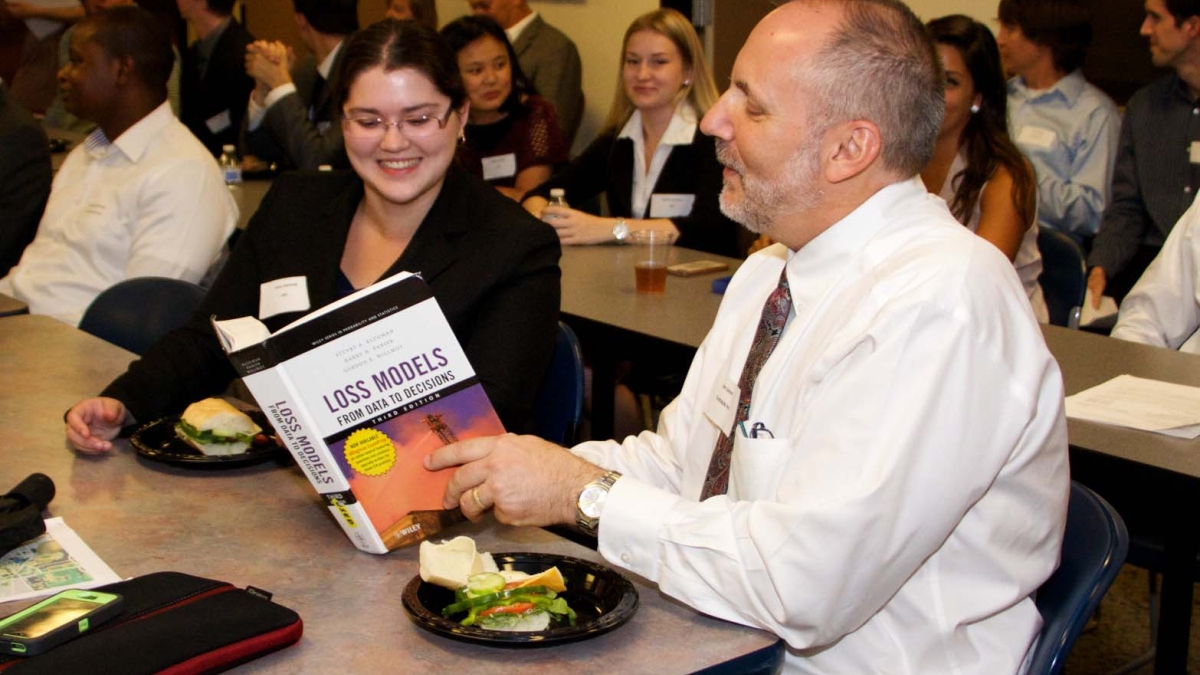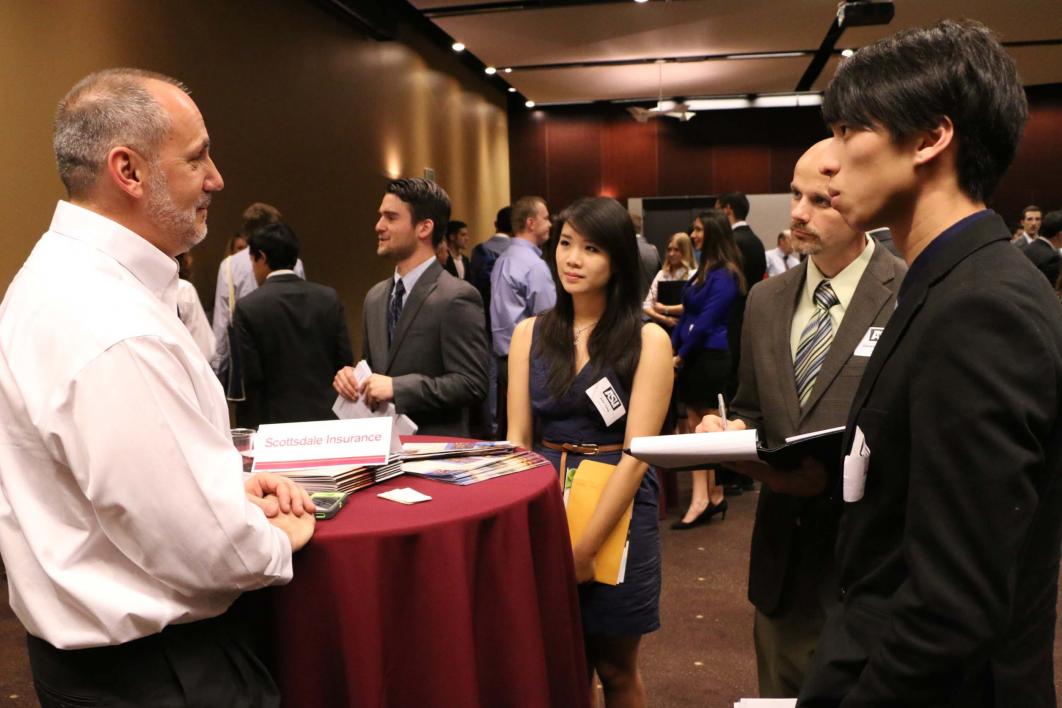Bullish on actuaries and bullish on ASU

Ken Levine, vice president of Nationwide Excess and Surplus/Specialty Insurance, with ASU actuarial science major Grace Kennedy.
Ken Levine, formerly from New York, now calls Arizona home and Arizona State his adopted alma mater. For the past 20 years, he has worked as an actuary for Nationwide Excess and Surplus/Specialty Insurance (formerly Scottsdale Insurance), and he is now their vice president. His zeal for the actuarial profession and for the new actuarial science program at ASU is infectious, and helped convince Nationwide to fund an endowed scholarship for ASU’s actuarial science program in the School of Mathematical and Statistical Sciences.
In high school, Levine’s career aptitude test suggested he consider the actuarial profession. At that time, his idea of an actuary was someone who spent all of his or her time studying morbidity tables, which didn’t sound that appealing. But in college, he majored in math and starting liking the idea of applying math to the business and financial world. He then remembered the high school aptitude test and decided to give the actuarial profession a try. He hasn’t looked back.
As with many Arizonans, Ken Levine migrated here with his young family. He graduated from Rensselaer Polytechnic Institute in Troy, New York, which he describes as “a great school.” However, the weather is cold and gray for six months of the year — in other words “miserable.” His wife, a Texan, convinced him to move south.
Opportunity came knocking at Scottsdale Insurance. The company works in the segment of the market called Excess and Surplus Lines.
“We write the risk that other property/casualty insurance companies either don’t want or don’t have the skill set to administer. It’s the hairy stuff — the more unusual risks,” explained Levine. He very much likes the dynamic nature of the profession and the shifting nature of his company’s products as the economy changes.
Market niche is also what inspired the School of Mathematical and Statistical Sciences to create its actuarial science program. It’s the only undergraduate program of its kind in Arizona, and one of a few in the intermountain west. And although ASU’s actuarial degree program is only in its second year, it already has more than 100 majors. Such popularity isn’t surprising, considering that Phoenix is home to more than 20 companies that employ actuaries.
Program coordinator Jelena Milovanovic (an actuarial associate) is joined by four other faculty members — May Boggess, Matt Hassett, Raymond Zhang and John Zicarelli. The seeds of the actuarial program go back many years to when Matt Hassett started teaching a couple of courses in actuarial science to mathematics majors. Many of the actuaries employed in the Phoenix area took courses from Matt either formally or informally, and John Zicarelli was actually Levine’s predecessor at Scottsdale Insurance. Levine refers to John as “one of the founding fathers of this actuarial community, along with Dr. Matt Hassett.” Although both Hassett and Zicarelli are now retired from full-time work, they both continue to give back to the profession and the Arizona community through teaching for the ASU actuarial program.
Giving back to the community, to the actuarial profession and to ASU is also what inspires Levine.
Ken Levine talking with students at Actuarial Science Career Day, hosted by the School of Mathematical and Statistical Sciences.
“I’m personally very connected to the university,” said Levine. “The fact that we have a professional degree program and talent pipeline right down the street from our company is something we need to support. The establishment of the Nationwide E&S/Specialty Scholarship demonstrates our commitment to developing this pipeline and acquiring top talent.”
Levine is also bullish on the actuarial profession. “There is a high demand for qualified actuaries in our industry,” said Levine. “The demand for the specialized talent we need is only going to grow due to the shift to big data and predictive modeling. Nurturing talent in our own backyard, by supporting ASU’s actuarial science program, is one of the best ways to ensure our actuarial talent needs will be met.”
In addition to convincing Nationwide to fund this actuarial scholarship, Levine sits on the board that advises ASU’s actuarial program on degree program content, financial development, and career options for its graduates. He is a frequent visitor to the actuarial science club, the annual career day, and the ASU classroom where he talks to students about how to succeed in the business workplace.
What advice does he share with ASU students? Study and preparation are important, especially for the series of actuarial certification exams that improve employment chances and in large part determine career advancement on the job. He advises students to get started early on these exams while still in college. “You may give up a lot of social time, but this is your career.”
He also encourages actuarial science majors to learn database management skills. In fact, the credentials for the scholarship recipient indicate a preference for someone with a background in SQL. Managing and analyzing large data sets is the norm in actuarial science.
Levine also serves up non-academic advice, “Network, network, network.” The actuarial industry is small, and students need to know the major players. He urges them to get their foot in the door through internships, seminars and by “just going to lunch” with someone in the industry.
Speaking of internships, they are not just for students. Actuarial program coordinator Jelena Milovanovic was an intern at Nationwide last summer. The experience provided her with valuable insight on the actuarial profession from a company perspectiv, which she brought back to the classroom.
Levine also had advice for the actuarial program. He sees ASU and Phoenix as being an insurance hub. “I’ve lived in other cities and worked in other cities — we have a very unique partnership here with the business community, a blend of senior statesmen and young enthusiastic leaders.”
ASU’s actuarial program has made excellent strides with amazing pass rates for its students taking actuarial certification exams. The support mechanisms for the program are in place — the career day, the actuarial club and the advisory board. Levine advises the program to aggressively advertise its accomplishments and to continue its partnership with industry.
With help from local leaders like Ken Levine, the future for ASU’s actuarial program is very bright.
More Science and technology

ASU-led Southwest Advanced Prototyping Hub awarded $21.3M for 2nd year of funding for microelectronics projects
The Southwest Advanced Prototyping (SWAP) Hub, led by Arizona State University, has been awarded $21.3 million in Year 2 funding…

Celebrating '20 Years of Discovery' at the Biodesign Institute
Editor’s note: The Biodesign Institute at Arizona State University wraps up its 20th anniversary with the sixth and final…

Student research supports semiconductor sustainability
As microelectronics have become an increasingly essential part of modern society, greenhouse gas emissions, which are associated…


